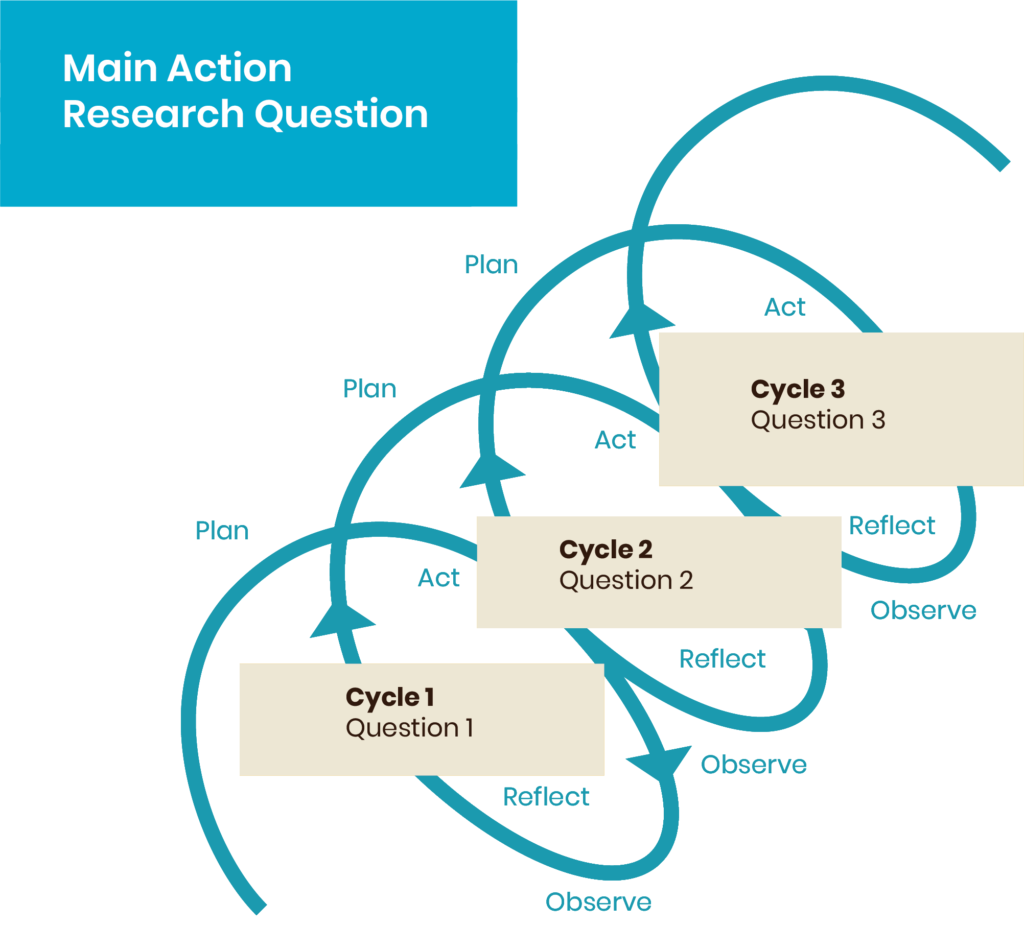Last week I thought about how many of us are stepping into a new period of review and planning; individually, as groups or as organisations. Just before the summer break I introduced a number of inquiry methods and I’m picking them back up now. Action Research may well be the approach that is most familiar to everyone, it is certainly commonly mentioned in the sector. However, I think that familiarity may mean that it is often the one that is misunderstood or is confused with simply taking action.
I was fortunate to be introduced to action research by Peter Reason (Centre for Action Research in Professional Practice – CARP) and the Human Potential Research Group (HPRG) at University of Surrey. Sadly, neither of these entities are still operating but their legacy has been strong. I’m bothering you with this detail because it gives an insight into the way I approach Action Research. My attraction to Action Research is its focus on democratic values, and the continual inquiry and development that is driven by curiosity. Action Research can be defined as:
…a participatory, democratic process concerned with developing practical knowing in the pursuit of worthwhile human purposes, grounded in a participatory worldview…It seeks to bring together action and reflection, theory, and practice, in participation with others, in the pursuit of practical solutions to issues of pressing concern to people, and more generally the flourishing of individual persons and their communities. (Reason and Bradbury, 2001)
That may seem a bit of a mouthful but for me it stresses the key elements and benefits of Action Research:
- It is about gaining practical insights into real time experiences
- It is values based
- It is participatory – done with and by the relevant community
- It focuses on what is important for that community at that point in time
- It is concerned with improvement and development
The approach is generally cyclical and involves four stages – plan, act, observe, reflect. Usually, a programme of action research would address an agreed overarching question and involve at least three cycles (each with their own sub-question) that can vary in length from weeks to years.

Action research can take different forms but tends to have a number of characteristics:
- It focuses on the connection between knowledge acquisition and action. It is concerned with combining practice and research so knowledge is generated about how and why improvements come about
- Action research is a collaborative partnership between the researcher and those participating in a project or programme
- Results are shared with everyone involved to inform future cycles of action and reflection
Action Research is not a singular approach, it is ‘a family of practices of living inquiry’. (Coghlan, 2011) Peter Reason outlines at least nine different action research type practices:
- Organisational change and development: promoting problem solving dialogue, review and understanding within organisations
- Co-operative Inquiry: a group of co-researchers who are also co-subjects address a common concern
- Action Science and Inquiry: bringing inquiry and action together in everyday practices with a focus on whether our intentions match our behaviours and impact
- Learning History: a collaborative approach to recording lived experience (this is an approach Alchemy offers, and has used a number of times and I will share more about in a later post)
- Appreciative Inquiry: uses an action research approach that starts with a ‘unconditional, positive question’ to guide the inquiry (Ludema and Barrett, 2001)
- Whole Systems Inquiry: takes a large group, whole community approach
- Participative Action Research: explicitly political, with a focus on empowerment and enabling the unheard voices
- Artistic and Creative Inquiry: using creative practices as the starting point for inquiry
- Public Conversations Movement: aimed at creating constructive dialogue between those who have different world views
I hope this overview and background is interesting and helpful. I’d encourage you to think about the kinds of Action Research you have either done in the past or might consider in future. Which of the above approaches resonate with how you work?
I will pick up on the practicalities, the ‘how to’ of some Action Research approaches in following articles. If you have a particular question, or experience of using Action Research in your work I’d love to hear from you.
References:
COGHLAN, D. 2011. Action research: Exploring perspectives on a philosophy of practical knowing. Academy of Management Annals, 5, 53-87.
LUDEMA, J. C. & BARRETT, F. 2001. In Reason, P. & Bradbury, H.(Eds.). Handbook of action research: Participative inquiry and practice (pp. 189–199). London: Sage.
REASON, P. & BRADBURY, H. 2001. Handbook of action research: Participative inquiry and practice, Sage.

